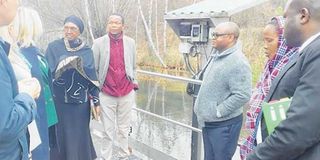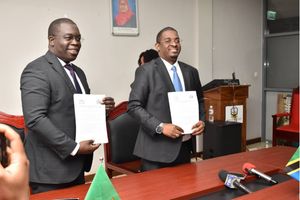Tanzania, Poland to focus on tech

Water permanent secretary Kitila Mkumbo (third right) listens to explanation on ozone water treatment during a site visit to Jaworzno in Poland. PHOTO | DAVID MBULUMI
Krakow. Cooperation between Tanzania and Poland should focus on developing simple and adaptable technologies in water supply and sanitation.
It should also cover non-revenue water, which is one of the main challenges in water utilities operations in Tanzania. That was said by the permanent secretary in the Ministry of Water, Prof Kitila Mkumbo, said during a symposium at AGH University of Science and Technology in Krakow, Poland, recently.
The theme of the gathering was “Managing water for all, an experience from water sector in Tanzania and Poland”. Papers on key issues in water management were presented. “Africa is urbanising very rapidly so we need sustainable water and waste water provision systems. If such systems are working elsewhere, then we adopt and adapt,” he said.
Tanzania has prioritised water development.
Prof Mkumbo mentioned areas which Tanzania could cooperate with Poland.
They are those on water resources management and water supply.
“Here we are talking about infrastructure development and management and water service delivery management. Our country is very big. There are lots of opportunities for engagement with you.” On human resource management and technology, h said: “Water sector is technology-intensive; so we need to develop human resource capacity. We are struggling in many areas. We are losing a lot of water in terms of non-revenue water we can work together in this as well.”
On waste management, he said universal access to sanitation was a goal in sustainable development goals.
“Poland seems so much developed in this area. So we need to see how we can work together in flexible, cost-effective and adaptable systems. In Tanzania using electricity is very expensive. What we learnt here is that we can use water and waste water to create energy from water to run water and waste water systems.”
Prof Mkumbo also called for the revitalisation of cooperation in areas of agriculture, technology and education.
Poland reopened its embassy in Tanzania in 2017 after it was closed in 2008.
He welcomed Polish tourists to Tanzania.
visit national parks, Mt Kilimanjaro and Zanzibar.
He also said Tanzania was blessed with a lot of fresh water resources, including three of the world’s lakes - Nyasa, Tanganyika and Victoria.
“We are trying hard to protect water sources for our demands and for generations to come.”
Earlier, the Polish deputy director in the Department of Economic Cooperation in the Ministry of Foreign Affairs, Dr Konrad Pawlik, described Tanzania as Poland’s important economic partner.
“The geographical distance has not been so far an obstacle, many Polish tourists visit Tanzania. The Polish tied-aid credit granted for Tanzania is close to being completed.”
He said the visit by the Tanzania delegation to Poland was an element of the joint Poland-Tanzania-OECD project for management in the water sector.
“The selection was not a random. Clean, accessible water for all is an essential part of the world we want to live. Water scarcity, poor water quality and inadequate sanitation negatively impact development of any country.”
He said Poland had a strong track record in developing and deploying technologies which include new methods to improve water use efficiency and water treatment, and monitoring water quality.
“We would like to share our knowledge and best practices. But this is not a teaching type but has a partnership character, we both learn each other, it will be mutually useful.”
During their visit, the Tanzania delegation met researchers from AGH University of Science and Technology.
The university was represented by Prof Jerzy Lis. The delegation also visited laboratories.
The delegation from the Ministry of Water included Prof Mkumbo as well as department heads and representatives Dorisia Mulashani, Nadhifa Kemikimba, Peter Kishiwa and Enock Wagalla.




